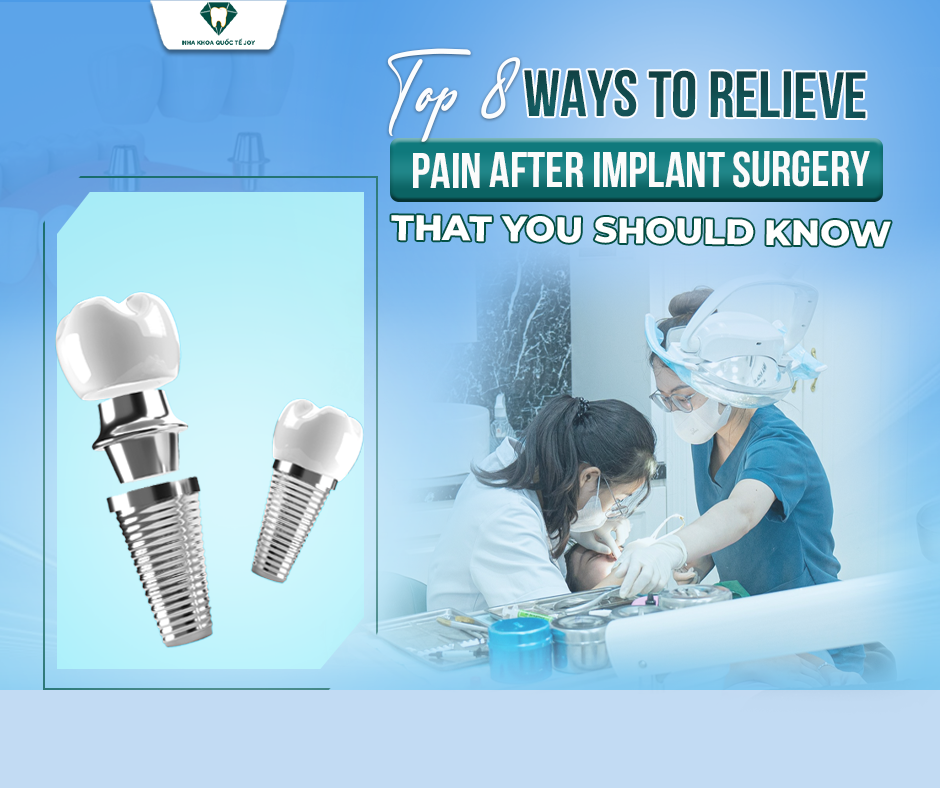After getting dental implants, experiencing mild swelling, pain, or sensitivity is almost inevitable. However, there is no need to worry. Today, Joy International Dental Clinic will share eight effective ways to reduce pain after dental implant surgery.
1. Pain After Dental Implant Surgery is Normal
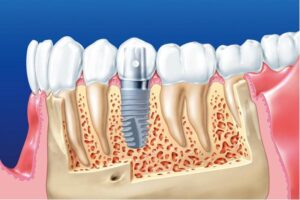
After dental implant placement, you may feel slight pain or discomfort. However, there is no need to panic. This is a normal reaction of the body as it adjusts to the new implant. The discomfort typically lasts only a few days and gradually subsides as the wound heals. Your dentist will guide you on proper care and prescribe painkillers and antibiotics to help reduce discomfort and prevent infections. The most important thing is to maintain excellent oral hygiene and strictly follow your dentist’s instructions to ensure a smooth recovery process.
2. Top 8 Ways to Reduce Pain After Dental Implant Surgery
2.1 Reduce pain after dental implant with Cold Compress

Immediately after the dental implant procedure, applying a cold compress to the cheek near the implant site can help reduce swelling, minimize bleeding, and soothe pain. Each application should last about 15-20 minutes, followed by a 15-minute break before repeating. This method is especially effective in the first few hours after surgery.
2.2 Take Painkillers and Antibiotics as Prescribed

Your dentist will prescribe pain relievers and antibiotics to prevent infections after the procedure. It is crucial to take the medication exactly as directed, without stopping early or exceeding the prescribed dosage, to avoid unwanted complications.
2.3 Avoid Chewing on the Implant Side
In the first few days, avoid chewing on the side where the implant was placed. This helps prevent pressure on the fresh wound, which could cause bleeding and slow down the healing process.
2.4 Rinse with Salt Water

Salt has strong antibacterial and anti-inflammatory properties. About 24 hours after the procedure, you can use a mild saltwater solution or a specialized mouthwash to clean your mouth. However, be sure to rinse gently to avoid disturbing the healing wound.
2.5 Maintain Proper Rest
A well-balanced rest schedule is essential for recovery after any surgical procedure. Avoid strenuous physical activity and late nights to help your body heal more effectively.
2.6 Follow a Proper Diet
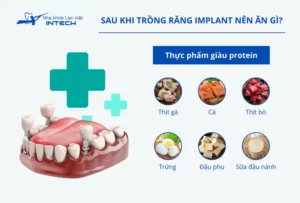
In the early days, opt for soft foods that are easy to chew and swallow. Avoid overly hot or cold foods, as they may irritate the surgical site.
2.7 Follow Your Dentist’s Instructions
Each individual’s recovery process is different. Strictly adhering to your dentist’s instructions ensures a faster healing process and prevents complications that may affect your daily life. If you experience persistent pain, excessive bleeding, or signs of infection, contact your dentist immediately for timely intervention.
2.8 Avoid Smoking
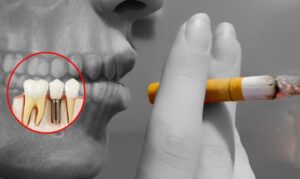
Smoking can slow down the healing process and increase the risk of infection and implant failure. If possible, refrain from smoking for at least a week after the procedure to ensure the best oral health outcomes.
3. Causes of Pain After Dental Implant Surgery
Dental implant surgery is an advanced restorative procedure, but some individuals may still experience post-operative pain due to various factors. The two most common causes include:
3.1 Pre-existing Oral Health Issues
If you had untreated conditions such as gum disease, periodontitis, cavities, or infections before the procedure, they could interfere with the integration of the implant with the jawbone. This may lead to prolonged pain, inflammation, and even implant failure.
3.2 Improper Surgical Technique
Dental implant placement requires a highly skilled and experienced dentist to follow proper procedures. If the implant is placed incorrectly, lacks stability, or the procedure is performed improperly, the patient may experience long-term pain, infections, or implant rejection. Additionally, using low-quality implants may also affect the healing process.
4. Abnormal Pain Symptoms That Require Immediate Medical Attention
4.1 Peri-implantitis (Implant Infection)
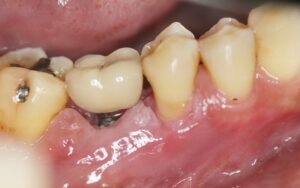
This is a serious complication caused by bacteria entering the area around the implant, leading to infection. Symptoms include persistent pain, swelling, gum bleeding, or pus formation. In severe cases, gum tissue around the implant may recede. If left untreated, peri-implantitis can cause implant instability, jawbone loss, and implant failure.
4.2 Implant Rejection or Incompatibility
Although rare, some individuals may experience implant rejection due to allergic reactions to the implant material or the body failing to integrate with the implant. Symptoms may include severe pain, prolonged inflammation, swelling, or the implant becoming loose. If you notice any of these signs, consult your dentist immediately for appropriate treatment.
5. Long-Term Implant Care for Lasting Comfort
Once the initial healing period is over, proper care of your dental implants is essential for long-term comfort and durability. Follow these steps to ensure your implants remain in good condition:
- Brush and Floss Regularly: Use a soft-bristle toothbrush and non-abrasive toothpaste to clean around the implant.
- Schedule Regular Dental Check-ups: Routine visits to your dentist help monitor the health of your implants and surrounding tissues.
- Avoid Hard or Sticky Foods: Chewing on very hard objects or sticky foods can put excessive pressure on the implants, leading to complications.
- Limit Alcohol Consumption: Excessive alcohol can slow down the healing process and increase the risk of inflammation.
Conclusion
Experiencing mild pain after dental implant surgery is common, but following the recommended methods to reduce pain after dental implant placement can significantly ease discomfort. Most importantly, follow your dentist’s instructions carefully for a smooth and fast recovery. If you have any questions, feel free to contact Joy International Dental Clinic for professional advice and assistance!

